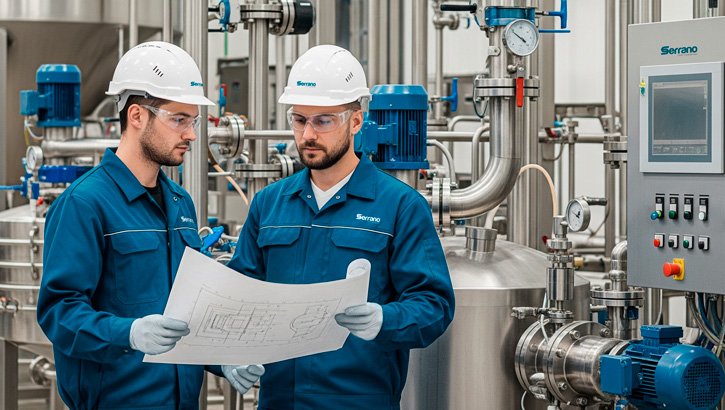How employee training can improve productivity and safety.
The food industry is a critical sector where precision, hygiene, and safety are paramount. The machinery used in this sector ranges from food processing equipment to packaging and refrigeration machines. Given the complexity and strict regulations associated with these operations, proper employee training is essential to ensure productivity and safety.
1. Productivity improvements
- Optimizing Machine Use: Training enables employees to understand how to operate equipment efficiently, reducing downtime, errors, and waste. A well-trained operator can quickly identify minor problems and resolve them before they affect production.
- Preventive Maintenance: Trained workers can perform basic preventive maintenance tasks, reducing downtime due to mechanical failures and increasing machine lifespan.
- Mastering New Technologies: Automation and the incorporation of advanced technology in the food industry require personnel trained to handle specialized software and hardware. Ongoing training ensures that employees can quickly adapt to these technological changes.
2. Increased security
- Reducing workplace accidents: Many machines in the food industry have moving parts, sharp blades, and components that operate at high temperatures. Training teaches employees how to use personal protective equipment (PPE) and follow safe procedures to prevent injuries.
- Regulatory Compliance: In many regions, there are strict regulations regarding food and occupational safety. Training employees ensures they follow legal standards, reducing the risk of penalties and strengthening the company’s reputation.
- Rapid emergency response: Training includes protocols for responding to critical situations, such as chemical spills, fires, or equipment failures. This minimizes risks and protects both workers and products.
Employee training is a key strategy for long-term success in a sector as competitive as the food industry.
3. How to implement an effective training program
- Initial needs assessment: Identify the most critical machines and employee experience levels to customize training.
- Collaboration with equipment manufacturers: Many manufacturers offer manuals, technical guides, and even training sessions specific to their products.
- Practical training: Complement theoretical sessions with simulations and supervised practice in the real work environment.
- Continuous training: Establish a periodic training schedule to address new technologies, regulatory changes, and refresh knowledge.
- Measuring results: Use key indicators such as accident reduction, improved production times, and staff satisfaction to evaluate the program’s effectiveness.
4. Additional benefits for the company
- Improved product quality: Training ensures that employees follow good manufacturing practices, resulting in safer, higher-quality products.
- Increased team morale: Trained employees feel more confident in their abilities and perceive that the company values their professional development.
- Competitive advantage: A competent workforce and efficient operations enable the company to stand out in the marketplace and better respond to customer demands.
In conclusion, investing in employee training on machinery use not only improves safety and productivity, but also strengthens organizational culture and ensures compliance with quality standards in the food industry. It’s a key strategy for long-term success in such a demanding sector.
Starting from specific specifications in each case, we carry out the design and comprehensive production of Complete Lines that cover the specific needs of each client. Tell us about your needs and we will carry out a personalized project that adapts to your requirements. If you wish, we can work together from the beginning of the activity, renew your equipment or adapt to your new needs. Together, we are stronger. Each Project is unique and personal. Our capacity and experience enable us to tackle any possible project within the Food sector.
